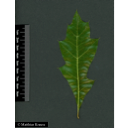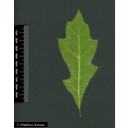Useful information about the taxon (species, subspecies, variety...)
Quercus georgiana M. A. Curtis 1849
Fagaceae
(APG IV)Georgia oak
Akzessionnummer: LG-T-092-18223
Pflanzjahr: 2000
Patenschaftstext: Ursula Wilms 24.12.2017
Taxon concept: The Plant List (2014), version 1.1
Distribution: USA: Georgia, Alabama (Piedmont Plateau)
Size: 8 - 15 (m)
Quercus georgiana M. A. Curtis - Accepted: Quercus georgiana M. A. Curtis bei The Plant List (2014), version 1.1; Familie: Fagaceae (APG III)
- Life form
- small tree
- Foliage persistence
- deciduous
- Fruits
- acorns
- Fruit ecology
- animal-dispersed (zoochorous) (small mammals and birds, e.g. woodpeckers)
- Soil conditions
- on shallow granite soils
- Natural occurrence (habitat)
- isolated granite outcrops, flat-rocks
- Vegetation typ and synecology (plant community)
- temperate mixed forests; in oak-pine forest communities
- Usage
- due to its glossy leaves and attractive autumn colour used as ornamental plant
- Phytopathogenic organisms
- is affected by the larvae of the Red-spotted Purple (Limenitis arthemis), Luna Moth (Arctias luna) and the Southern Hairstreak (Satyrium favonis) feeding on the leaves
Erhardt, W., Götz, E., Bödeker, N. & Seybold, S. (2008): Der große Zander. Enzyklopädie der Pflanzennamen. Band 2. Arten und Sorten. Eugen Ulmer KG, Stuttgart (Hohenheim), 18. Aufl., 2103 S.; The International Plant Names Index (2009). Published on the Internet http://www.ipni.org; Courtesy to IPNI, 2009. Exported from IPNI at date: 2009-09-22 20:17:51; The IUCN Red List of Threatened Species. www.iucnredlist.org;
Diese Webseite verwendet Google Maps, um Karten und Standorte von Pflanzen in den Hohenheimer Gärten anzuzeigen. Dadurch werden unter Umständen Daten an Google weitergeleitet, was mit einer Verarbeitung Ihrer personenbezogenen Daten verbunden sein kann. Die Datenschutzerklärung von Google finden Sie hier: Datenschutzerklärung von Google


